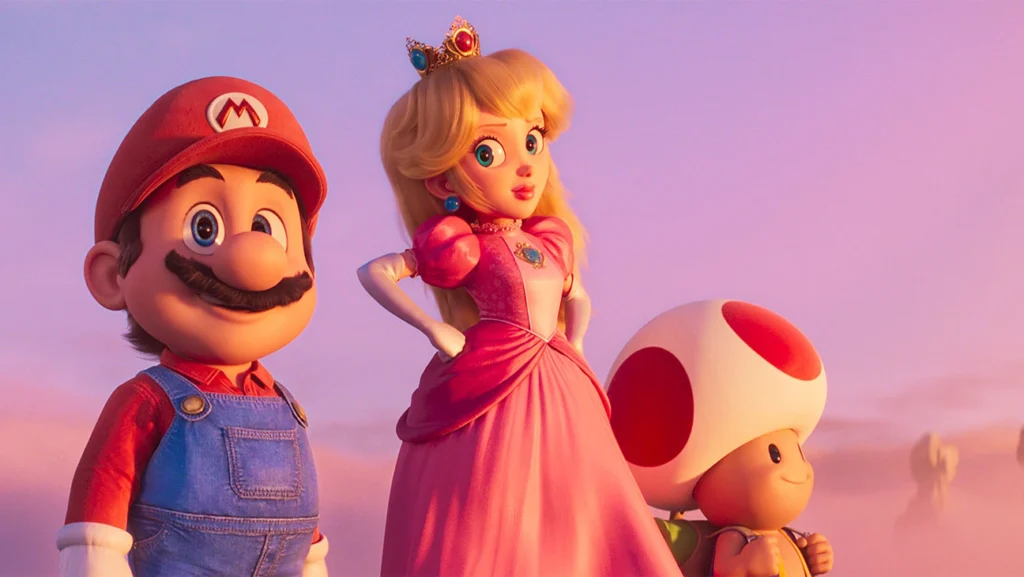The Super Mario Bros. Movie is a beautiful, soulless cash-grab
Written by Ian Thomas Malone, Posted in Blog, Movie Reviews, Reviews
Video game adaptations often struggle with an innate reality of the genre. Playable protagonists like Mario are often left fairly undefined as characters. Video game Mario doesn’t really talk behind catchphrases like “Let’s a go” and “Mamma mia.” Villains like Bowser, adorable side characters like Toad, and retired damsels in distress like Peach define the personality of the franchise. Mario is mostly there as the avatar for the player to take it all in.
The Super Mario Bros. Movie doesn’t necessarily pretend like Mario has much of an identity so much as it ignores the issue completely. Mario debuted back in 1981 in the arcade game Donkey Kong, back before video games needed plots. Along the way, Luigi has been established as a cowardly little brother, a convenient sibling dynamic that the film adaptation leans on as the core of its own narrative.
The film mostly follows the Mario Bros. efforts to establish their plumbing business in Brooklyn and Queens, sucked into the Mushroom Kingdom while trying to get to the bottom of a city-wide flood. Separated from his brother Luigi (Charlie Day), Mario (Chris Pratt) quickly stumbles upon a territorial dispute between Peach (Anya Taylor-Joy), queen of the Mushroom Kingdom, and Bowser (Jack Black), ruler of the Dark Lands who hopes to use the Super Star to marry Peach and conquer their broader, semi-defined universe that also includes the Jungle Kingdom, ruled by Cranky Kong (Fred Armisen). Cranky’s son Donkey Kong (Seth Rogen) is also there, for little reason other than somebody thought it might be weird for him to not be in the The Super Mario Bros. Movie.
The plot is immensely perfunctory, a slight riff off the game’s original premise that does its best to do away with the franchise’s regressive themes. Peach is still basically just there to be the object of everyone’s affection, but someone else gets a turn to be locked in a cage. Bowser does grapple with the idea of consent, following Super Mario Odyssey’s lead in presenting villainy that’s fit for the post-#MeToo era.
Directors Aaron Horvath and Michael Jelenic do a fantastic job with the technical work, including plenty of Easter Eggs that are bound to please adults in the audience. The film actually brings the silly concept of platforming to life in a way that feels authentic rather than perfunctory. The animation is top notch and the score serves as the film’s secret weapon, well-timed sequences that elevate many gags beyond mere nostalgia.
The voice acting and script are both competent and unremarkable. Of the voice cast, Black seems to be the only one who’s truly enjoying himself. Day suffers from an absence of humor fit for his style. Pratt and Taylor-Joy seem to have showed up content to play leading characters, neither bringing any sense of personality to either character. Rogen is aimlessly clownish as Donkey Kong, forced into a generic chest-pumping rivalry with the decidedly less macho Italian plumber.
The Super Mario Bros. Movie seems genuinely concerned with putting on an authentic experience for children and their parents alike. The first-rate production values almost redeem this bland, soulless blockbuster. With a brisk runtime of only 92 minutes, the film hardly overstays its welcome, a product of the reality that there’s hardly any narrative that needs addressing. The themes are shallow and the conflict is more than predictable for anyone who knows what Mario is.
Much of the film’s narrative issues stem from the one major element where Horvath and Jelenic truly broke from the canon. The decision to give Mario and Luigi a broader extended family may have made some sense from a broader industry perspective, the kind of feedback you might glean from a focus group. The time spent on characters nobody cares about detracts from all the film’s other ambitions, particularly in the third act where it wants to stuff in tributes to Donkey Kong and Mario Kart into an already bloated dynamic.
That sense of ambition might have been admirable in a world where the film had already laid out its themes, but The Super Mario Bros. Movie doesn’t really have a message. There’s little to take away from this movie other than the fact that it’s beautiful and decidedly not as bad as its 1993 live-action predecessor. Kids will enjoy this movie. Parents won’t want to gouge their eyes out. That might be enough for many to justify the experience, but something this beautiful made with so much obvious love should not be such a soulless, generic cash grab. This movie is pathetic and sad.












Utterly shocked at how ignorant and tone deaf this review is
You couldn’t ask for more soul especially when it involved THE ORIGINAL CREATOR
“this movie is pathetic and sad” I guess this “movie critic reviewer” confused his life with the movie.